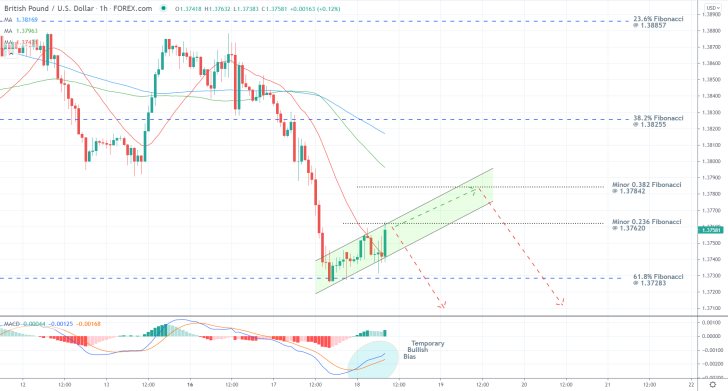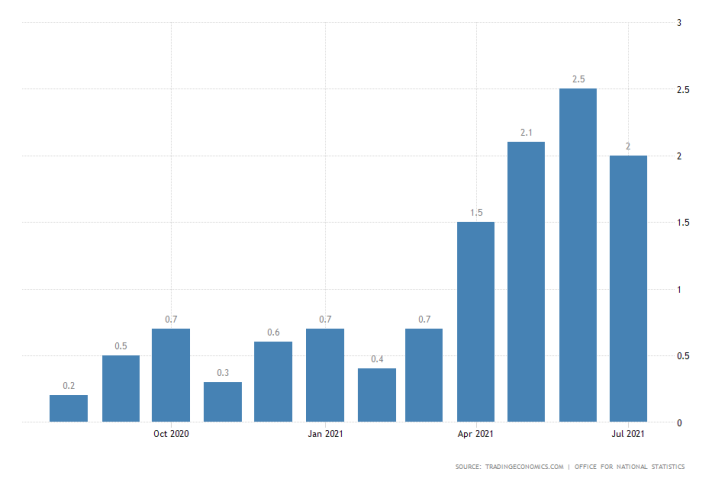
Today's inflation data managed to stave off GBPUSD's newly emerging downtrend temporarily. However, substantial bearish sentiment remains. You can read more about it from our comprehensive analysis of the pair.
British headline inflation fell by 0.5 per cent in July, surpassing the consensus forecasts. The bigger than anticipated drop in consumer prices follows a global trend of easing demand.
Economic activity in Britain is, on the whole, growing faster than BOE's baseline recovery scenario estimates. UK's gross domestic product and employment growth have both exceeded expectations. Even still, this does not seem enough to strengthen the pound against the advancing greenback.

As can be seen on the hourly chart above, the GBPUSD is establishing a pullback presently, which is part of a broader downtrend. The inflation data catalysed the pullback, but it is interesting to point out that it emerged from the 61.8 per cent Fibonacci retracement level at 1.37283.
The latter represents the last major support that the downtrend has to penetrate before it can become quite robust, which is why it is unsurprising that a temporary break emerged just here. The pullback is, in other words, most likely a false movement before the price action can resume heading lower.
Its temporary nature is underpinned by the MACD indicator, which signals a momentary prevalence of bullish bias in the market.
The price action is currently probing the minor 0.236 Fibonacci retracement (as measured against the last downswing on the hourly chart) at 1.37620. This is the first level where the pullback could be terminated. Accordingly, if the price action breaks out above it, the next potential turning point can be found at the minor 0.382 Fibonacci at 1.37842.
Inflation falters more than anticipated in July
Headline inflation in Britain was reported at 2.0 per cent earlier today by the Office for National Statistics. This measures a 0.5 per cent drop from the multi-month peak that was reached a month prior in June.

The consensus forecasts were anticipating a smaller contraction of the Consumer Price Index (CPI) to 2.3 per cent.
Trendsharks Premium
Gold is undergoing a correction, as investors take profits to offset losses from falling stock prices, impacting their margins. However, we anticipate a renewed wave of [...]
The Swiss stock market index is mirroring its global counterparts, such as Germany 40 and US100, experiencing a sharp decline following the announcement of new [...]
We’re analyzing the weekly chart to grasp the broader market trend. Over the past three years, the US30 index has surged by 17,000 points, often resembling a nearly straight [...]
Over the past week, the DAX has experienced a sharp decline, plunging by an astonishing 3,400 points. This downward movement is not isolated, as its international counterparts, such as the UK100 and US100, are also facing significant [...]
EURUSD recently formed a double top at 1.0930, signaling a potential trend reversal, and has since begun a correction. After a 600-pip rally since early March, a pullback at this stage is both expected and healthy. Given these conditions, we are placing a [...]
Since early March, EURJPY has surged nearly 1,000 pips, providing us with several excellent trading opportunities. However, as the rally matures, many early buyers are beginning to take profits, leading to a noticeable slowdown in the uptrend. On Friday, the pair formed a [...]
The AUDJPY currency pair continues to be dominated by bullish momentum, as multiple golden cross patterns reaffirm the strength of the ongoing uptrend. Despite this, we are witnessing a much-needed [...]
The EURAUD currency pair appears to be undergoing a trend reversal, signaling a potential shift in market direction. A notable technical development is the formation of a Death Cross on the chart, a widely recognized bearish indicator that typically suggests a [...]
After securing an impressive 200-pip profit last week, the EURJPY currency pair is now undergoing a southward correction, retracing some of its recent gains. Despite this temporary pullback, the Golden Cross remains intact, reinforcing our view that the overall trend continues to be [...]
The appearance of a Golden Cross in Silver strengthens our analysis that the metal is currently in a strong uptrend, indicating further bullish momentum in the market. This technical pattern, where the short-term moving average crosses above the [...]
This trade presents a considerable level of risk and can be classified as an opportunistic move based on recent price action. The GBPUSD currency pair has experienced a substantial bullish rally, surging by nearly 500 pips in a strong upward movement. However, after this extended period of appreciation, the pair is showing signs of a potential [...]
The anticipated Death Cross on the SMI20 appears to be failing as price finds strong support at the 23% Fibonacci retracement level. After testing this area, the index has shown bullish strength, printing several large green candles, signaling an increase in [...]
A Golden Cross has just appeared on the USDJPY chart, signaling a potential bullish move. This technical pattern occurs when the 20 period moving average crosses above the 60 period moving average, a widely recognized indication of increasing [...]
After 2 months of a down trend, we finally see some indications of price recovery for Oil. The golden cross, a historic buy signal, supports this [...]
For the past month, the German DAX40 has experienced a remarkable 10% surge, reflecting strong bullish momentum. Despite ongoing market volatility and frequent pullbacks, every dip continues to attract fresh buyers, reinforcing the [...]
Oil continues its downward trajectory, despite occasional pullbacks. The overall trend remains bearish, reinforced by multiple Death Cross patterns, a classic sell signal indicating further weakness. Adding to this bearish outlook, the critical [...]
Over the past few days, gold has experienced a sharp decline of more than $100. This downturn can be attributed in part to traders securing profits to manage their margins, which are under strain due to the significant drop in major indices. Currently, gold has fallen below the [...]
The NASDAQ 100 index is showing strong bullish momentum, as evidenced by the formation of a Golden Cross on the chart. This classic buy signal occurs when the short moving average crosses above the long term moving average, suggesting that upward momentum is [...]
The EURAUD currency pair has encountered a significant resistance level, failing to break above the critical 61% Fibonacci retracement level. This suggests that bullish momentum is weakening, reinforcing the case for a potential downward move. Given this technical setup, we favor entering a [...]
The UK100 is experiencing a remarkable rally! Over the past few weeks, the British stock market index has surged nearly 800 points. Each minor dip has attracted more buyers, fueling the bullish momentum. However, since last week, we’ve observed a slight [...]




















